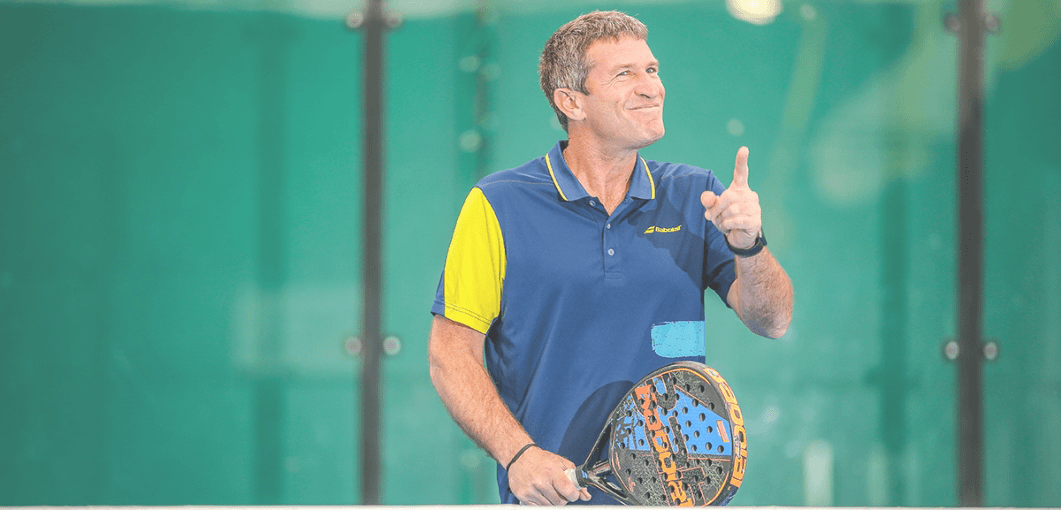Family mandates are always there, and many surrender to them. You have to be a lawyer like your grandfather, father and uncles. You have to take over the antique shop that your great-grandfather opened in 1912. You have to spend hours and hours in the logistics company with your father, mother and sister.
Something like that happened to Gustavo Spector: he was doing well and happy with padel, but his parents kept asking him, ‘When are you going to get a proper job?’
Until one day, Gustavo gave up. He sold the padel club and stuck to the family mandate: his life would be that of an insurance broker, which is what he had been fed since he was a child.
And he spent five years working as a broker. Until one day he said, ‘I can’t take it anymore, I want to go back to padel.’ He was living a life he didn’t want to live.
Spector had been a good tennis player in the first division of Argentinean clubs, a recognized player in Tucumán Lawn Tennis, the jewel of the smallest province in Argentina. The country’s independence was declared in Tucumán in 1816, although many Europeans know the name because many of the lemons they consume come from the province.
The last years of the 1980s and early ’90s marked the boom of padel in Argentina, a country where tennis is popular as in few places in the world. Spector, then a teenager, was no stranger to that.
‘I grew up as a tennis player, and at 19 I started playing padel. It was by chance, I found myself on a court with my lifelong tennis partner. We started playing together and for seven years we were number one in the region. We turned professional, I started managing a club, I played the World Cup in Spain in 1996. Those were beautiful years in the ’90s.’
Until the blackout came: the five years of obedience to the family mandate. Just an interlude that reaffirmed Spector’s love for padel.
He wanted to relive and earn his living from the sport, but Argentina, a country with a chronically unstable economy, did not offer the best guarantees. ‘I realised that I had been very good at what I was doing, but the work and economic situation with padel in Argentina was uncertain. If I wanted to return to the sport it had to be in Europe, where there was a long-term project. I had contacts with tennis in Spain and Italy. My sister is an artist and lives in the Italian part of Switzerland, near Lugano, so I jumped into the adventure.’
That adventure deposited him in Milan to develop the school of a new tennis club, but padel was still in his heart.
‘After eight years at the club in Milan, I proposed to the owner to add padel to the club. Padel in Milan did not yet exist, and he accepted my proposal if the investment was made by me. I bought first one, then two, then three padel courts, working with padel and tennis at the same club.’
Luck then took a hand. To Spector’s boldness and drive, the Italian Tennis Federation, which had embraced padel, added an offer. ‘I was chosen to develop all the federation's courses, and then to be the coach of the Italian national team. I was in the right place at the right time.’
The Argentinean worked for a year without pay – the federation only covered his expenses. But the gamble worked: the Italian team won the European championship in 2019.
Today, Spector is a happy man of two worlds. ‘I’m 51 and I've been living in Italy since I was 32. I’ll always feel Argentinean, but recently I was given Italian nationality and I also feel very Italian. Italy gave me the chance to develop in what I love most.’
Still Spector continues to dream big. ‘Padel is a magical sport, and with better management and leadership it could have a place at global level as a great sport. In the future it has to be among the most played sports in the world.’
Magic sport? ‘Yes, it is magic because it is the most democratic and inclusive sport that exists. People have fun. In other sports there comes a time when you lose a little bit of the joy. Not in padel. It’s a sport that also generates a great sporting relationship between men and women, because mixed doubles is played like perhaps no other sport. It’s a sport that never dies, that never leaves you.’



